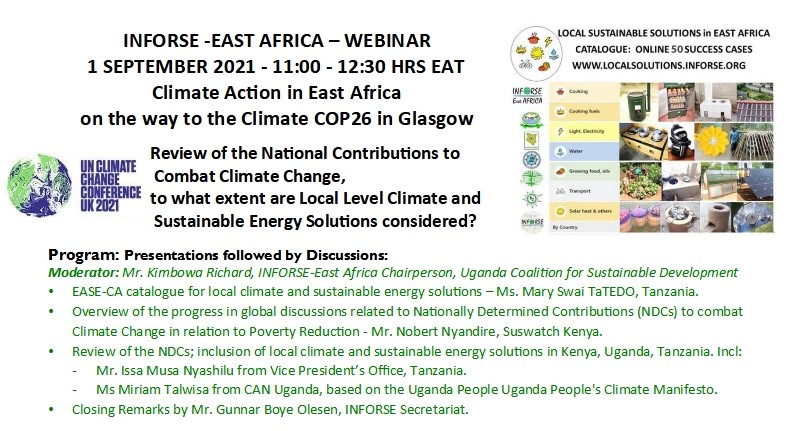INFORSE - EAST AFRICA – WEBINAR 1 SEPTEMBER 2021
- Category: News
- Published: Saturday, 04 September 2021 06:38
- Written by Webmaster
- Hits: 1849
INFORSE - EAST AFRICA – WEBINAR 1 SEPTEMBER 2021 - 11:00 - 12:30 HRS EAT Climate Action in East Africa on the way to the Climate COP26 in Glasgow Review of the National Contributions to Combat Climate Change, to what extent are Local Level Climate and Sustainable Energy Solutions considered?
Program: Presentations followed by Discussions:
Moderator: Mr. Kimbowa Richard, INFORSE-East Africa Chairperson, Uganda Coalition for Sustainable Development
- EASE-CA catalogue for local climate and sustainable energy solutions – Ms. Mary Swai TaTEDO, Tanzania.
- Overview of the progress in global discussions related toNationally Determined Contributions (NDCs)to combatClimate Change in relation to Poverty Reduction - Mr. Nobert Nyandire, Suswatch Kenya.
- Review of the NDCs; inclusion of local climate and sustainable energy solutions in Kenya, Uganda, Tanzania.
- Issa Musa Nyashilu from Vice President’s Office, Tanzania.
- Ms Miriam Talwisa from CAN Uganda, based on the Uganda People Uganda People's Climate Manifesto.
- Closing Remarks by Mr. Gunnar Boye Olesen, INFORSE Secretariat.
The purpose of this webinar is to examine the extent to which local climate and sustainable energysolutions are featured in the East African Countries’ NDCs, and feature a Catalogue of 60+ local solutionscollected and published by cooperating NGOs of INFORSE-East Africa. Available online: http://localsolutions.inforse.org/
Background – What are the NDCs?
 The Nationally Determined Contributions (NDCs) are efforts by each country to reduce national emissions and adapt to the impacts of climate change.The Paris Agreement of the United Nations Convention of Climate Change (UNFCCC) requires each country to prepare, communicate and maintain these contributions that it intends to achieve.
The Nationally Determined Contributions (NDCs) are efforts by each country to reduce national emissions and adapt to the impacts of climate change.The Paris Agreement of the United Nations Convention of Climate Change (UNFCCC) requires each country to prepare, communicate and maintain these contributions that it intends to achieve.
The NDC’s are national climate plans highlighting climate actions, including climate related targets, policies and measures governments aims to implement in response to climate change and as a contribution to global climate action. Central to the NDCs is the concept of national determination.
Ahead of Paris UNFCCC COP21, 192 countries submitted their “Nationally Determined Contributions” (NDCs) in an ad-hoc fashion, covering a range of time frames out to 2025 or 2030. Right now, in the run up to the UNFCCC COP26 in Glasgow,countries are updating these climate pledges, or submitting new ones, as part of the Paris “ratchet mechanism” designed to raise ambition over time.
In Africa, 52countries have submitted their first NDCs and are now in the process of submitting revised NDCs. The Current NDCs of East African countries predominantly focus on adaptation but also include mitigation actions. However,these NDCs are not explicit on local level climate and sustainable energy solutions on adaptation and mitigation actions.
This is some how ignoring the effective and efficient low emission local solutions that offer a sustainable alternative to support more productive and resilient communities with social, economic and environmental returns.
UNFCCC estimated that the average annual fuel wood saved from one biomass energy-efficient cook stove in Kisumu county of Kenya was about 1350 kg per stove per year. Therefore, incorporating local climate and sustainable energy solutions in NDCs can contribute to improving livelihoods and reducing inequality, securing food and water, improved resilience and disaster risk reduction (climate adaptation), and biodiversity conservation, in addition to the climate mitigation co-benefits.
EASE-CA Project & Proceedings: https://www.inforse.org/africa/EASE.htm | www.tatedo.or.tz & www.ugandacoalition.or.ug&www.suswatchkenya.org | Catalogue of 60+ Local Sustainable solutions: http://localsolutions.inforse.org/ | FB event: https://www.facebook.com/events/824864401553247

